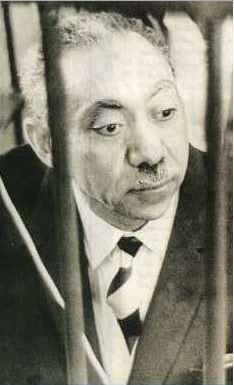In order to understand how ISIS (Islamic State of Iraq and Syria) came to be, it is essential to fully comprehend the ideas of Sayid Qutb, the father of militant Islamism. As discussed in part one of this series, Hassan al-Banna, the founder of the Muslim Brotherhood, highly influenced a myriad of Muslim youth with his ideas, Sayid Qutb being one of them. When Banna was assassinated in 1949, Sayid Qutb filled the ideological vacuum within the Muslim Brotherhood.

Despite his secular education, Qutb became political Islam’s most influential ideologue. He joined the Muslim Brotherhood in 1951 following his return from an educational mission in the US. This mission ignited deep-rooted religiosity in Qutb, as he was horrified by American culture. He was concerned with American society’s advancement in production but “abysmally primitive” nature, in his view, with respect to senses, feelings, and behavior. By 1952, he became one of the leading figures of the Muslim Brotherhood. However, tensions between the organization, and Egypt’s new leader, Gamal Abdel Nasser, increased and resulted in Qutb’s imprisonment and torture. During his imprisonment, he wrote Milestones, the manifesto that is followed by most Islamist movements today.
In Milestones, Qutb expressed a political vision that was more radical than Banna’s. Qutb’s main premise is in his interpretation of jahiliya, a term used to refer to the pre-Islamic tribes of Arabia, who were in a ‘state of ignorance’ world. To Qutb, contemporary Egyptian government society was still in jahiliya because legislation does not rest on divine law, or shariah. Qutb defined any society that is not Muslim as jahili, and even proclaimed many Muslim societies as ignorant for believing in “sovereignty other than God’s, and from this they derive laws, judgments, traditions, and values.” Thus, Qutb described the concept of hakimiyah as the solution to the state of jahiliya, where the only legitimate sovereignty belonged to God. In hakimiyah, God is the supreme legislator and ultimate source of governmental and legal authority. The goal is to achieve an Islamic state that is governed by shariah, with God as the only sovereign. To Qutb, this goal can be achieved by establishing a vanguard that is tasked with eliminating ignorant society and abandoning its values and ideology.

How would Qutb achieve hakimiyah? Through offensive jihad. The most influential aspect of Qutb’s ideology was his conception of jihad, as it parallels the views of many jihadist groups. According to Qutb, Nasser’s regime and non-Muslim societies were enemies of Islam, and thus offensive jihad was justified. Unlike other Islamists before him, Qutb emphasized the “jihad through sword” to “clear the way for striving through preaching.” This illustrates a clear deviation from Banna’s ideology, as he believed in establishing a grassroots Islamic order through preaching and persuasion. Moreover, Banna advocated a defensive, anti-colonial jihad, which Qutb criticized and deemed “defeatist.”
Unlike Banna, Qutb’s political vision outlined a framework for an Islamic state with clear concepts of sovereignty. However, Qutb’s ideas of Islam as an all-encompassing, political religion, demonstrates Banna’s definite impact on his ideology. In addition, Qutb did not limit himself to the geographical boundaries of Egypt by referring to the “one homeland in which the Islamic state is established,” the ummah, which is a concept that did not result from his detention but from his exposure to Banna’s ideology. However, Qutb’s use of the term jahiliya as a defining element in contemporary society is a clear deviation from Banna’s political thought. Banna never called Egyptian society un-Islamic, even if he opposed the regime. This stark difference between both ideologues demonstrates the evolution of Islamist ideology and an emergence of takfir, or excommunication, in Qutb’s political vision. Qutb had a significant impact on the evolution of political Islam, and the emergence of both local and international jihadist groups after his execution in 1966 is a testament to this claim.
Both Qutb and Banna believed in pan-Islamism and argued against geographical borders. We see this same ideology in ISIS, which is simply evident in the name they chose to call themselves. This transcendence of borders is also evident with the spread of ISIS branches in Libya, the Sinai Peninsula in Egypt, and Afghanistan. It is clear that Qutb serves as the ultimate ideological inspiration for ISIS, since it views itself as the vanguard going through an offensive jihad to eradicate whomever it perceives as infidels and establish an Islamic state.




